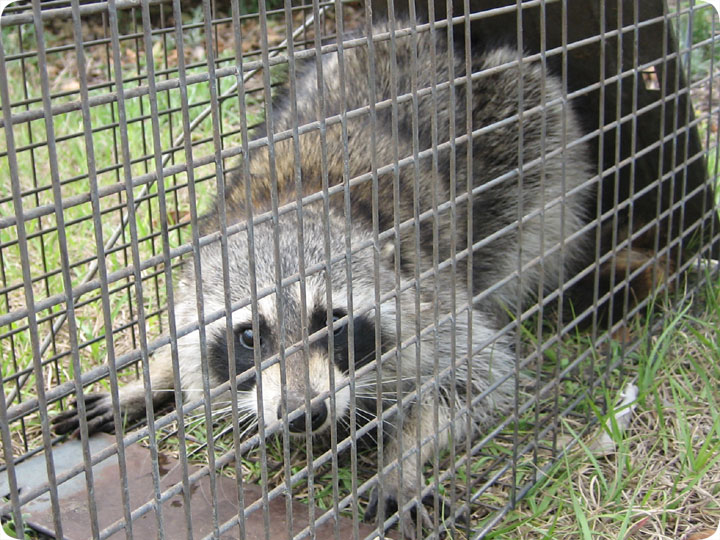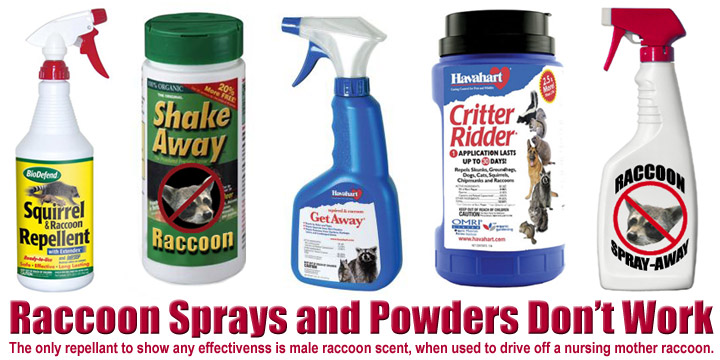-
info@aaanimalcontrol.com
Call us for help in your town
Humane Wildlife Education
Raccoon Repellent

10.11.2003 - I get a lot of phone calls and emails asking about raccoon repellent. I respond to all of these emails explaining that there is no such thing as an actual effective raccoon repellent or deterrent. Many are marketed and sold. Some of the most common repellants
sold are simply mothball flakes. They don't work, they can actually make you sick, and they are bad for the environment. Ammonia soaked rags don't work either. I've tried, in some very tight quarters where I thought it might work, but it does not. Some other repellents are based
on predator urine. These can actually work if it's a female raccon with young who will be intimidated out of the area if she thinks that there's a predator. But it has to be a lactating female in an attic, and it doesn't always work. Ultrasonic sound machines do not work at all and
the FTC has issued an official warning about their fraudulent nature.
There may be a time in your life where you have to deal with a creature that wants to live on your property just as much as you do. They have spotted a cozy area that they want to call their own and you need to find a way to stop them. A lot of the time, this will be a raccoon, an animal that will either set up shop on your property or regularly return in search of food or resources. It can be dangerous to let this animal stay on your property and can lead to damage of property, foul odors, and potential harm to domestic animals, children, or yourself.
The best approach to raccoon control is to either eliminate whatever is attracting them to your home,
such as keeping garbage or pet food inside, or to seal off your house so they can't get in, or when removal is absolutely necessary, to trap them in live cage traps such as
shown above. Unfortunately, repellents just don't work.
Click here for my HOW TO GET RID OF RACCOONS comprehensive guide on raccoon removal.

Raccoon repellent moth balls -
Mothballs are the favorite low-cost repellent of the do-it-yourselfer. They are said to work for everything from insects to armadillos. The truth of the matter is that moth balls are not an effective repellent for anything other than what they were designed for—moths and insects. The ingredients in the pungent white balls are a mixture of a deodorizer and an insecticide. They are known carcinogens, and as such are dangerous to most humans and animals. Just because they are cancer causers doesn't mean the smell will drive an animal away. There are a lot of hazardous substances out there we expose ourselves to everyday. I we don't know they're bad for us, we never learn to avoid them. Raccoons are one of the more intelligent nuisance animals a homeowner has to deal with. Because of this, if the smell of mothballs offends a raccoon, the animal is more likely to push the box out of the area or cover it over. Most professionals say that the animals seem undisturbed by the odor and act as if the mothballs aren't even there. If you insist on trying them at least the little things are inexpensive. Remember: There is no substitute for trapping and removal.
Here are some emails I've gotten from people who try to use repellents:
Hi David -
I found your webpage on aaanimalcontrol.com and think you might just be the person to help me.
We have been struggling with a raccoon in the attic for approximately three years. We have tried to chase it our many many many times using light and ammonia. Once we even thought we had fully succeeded and replaced all the insulation. Well He/she will stay away for a few
days and then returns. He always returns - making new entrance holes or tearing out our "fixes". We have seen the raccoon several times (he is huge) and we hear him frequently (multiple times per week) above the bedrooms.
I am done trying to get him to leave permanently and need to turn to a professional for assistance. I am curious as to what you do with the animal once it has been trapped, what your guarantee is as far as him not returning and what your fee structure is like. I also wonder how long this generally will take. Basically any information you could provide this novice would be greatly appreciated.
Thank you for your assistance. Tressa
David –
I've been doing some research the past few days and ran across your web page info. Really great and very informative, thanks.
My 5 yr old was begging me to put up a bird feeder, so I did, and a raccoon (I'm assuming) moved into my attic this past weekend. During the day yesterday, I closed the hole in the soffit screen using appropriate wire mesh. It had a fit trying to get out last night; sounded like someone jumping up and down. The noise stopped after an hour or so and I looked and saw another hole in the old screen so I assumed it had escaped. I'm guessing this is the culprit as I had a captured one this morning in my Havahart trap. Strangely, there was another hole (3rd overall) in the flimsy soffit screen next to the one I noticed last night.
I've put newspaper in both holes to determine if there may be anymore remaining in the attic before I wire it shut for good, but fear this may have been a female and left a nest behind.
I am hoping I can install some sort of deterrent to keep them away for good. Any suggestions would be appreciated. Have a good day.
Regards,
Sean
Houston, TX
Hi, I've just cleaned my outbuilding, its having been a raccoon latrine over the past few years. Oh, my, was that disgusting work! I live in Maryland and I couldn't find anybody to do the work for me. I was wondering if you could give me the name of a biological cleaner I could use to break down the residual feces and urine. I fear the smell will never leave. Maybe you can help.
I'm also thinking of getting one of those high-pitch sound machines to scare future raccoons away. Thanks so much for any assistance you can give me. Kindly, Tracey Eldridge
Do it yourself: Visit my How To Get Rid of Raccoons page for tips and advice.
Get professional help: Visit my Nationwide Pro Directory of wildlife removal experts.
For more wildlife stories, click my Wildlife Blog
or click my below banner to hire a local trapper.
So you may be wondering what are the most effective ways to stop this animal choosing your home as an ideal destination. Well, one tactic to keep these creatures off your property is various forms of raccoon repellents. The repellents come in a number of different varieties which allow you to find the method that best suits the area of application. Here is a rundown of the best raccoon repellents to consider when dealing with these pests.
Odor Repellents
If there is one thing that will stop an animal from settling into a new habitat, it's an unnerving or unfamiliar smell. The two most common odor repellents tend to be an ammonia solution or mothballs. While mothballs can be effective, they are also toxic to humans, so unless this is in an open or unused area, we wouldn't suggest you use these.
The ammonia solution tends to be the most effective method to get the raccoon's attention. They have a sensitive nose that will pick up this smell immediately and makes it less likely for these animals to settle down on your property. However, it is reported that raccoons are more likely to cover up an odor or attempt to remove it than to vacate altogether. So bare this in mind and be sure to test the other methods too.
Taste Repellents
This is a solution that can be store-bought or made from home. It includes tastes that are particularly putrid to raccoons and makes an area inhospitable for them. A common mixture for this repellent consists of hot sauce, cayenne pepper, and water all mixed into a handy spray bottle. Then once mixed, just spray this mix over the area you wish to protect and it's rather unlikely that a raccoon will hang around that area again.
The only issue with this method is the upkeep. If this is an outdoor area, the rain will wash away the solution each time you apply. It will cost you a good deal of time to apply to the desired area every time it rains. So if you're looking for a low maintenance method, this may not be ideal for you depending on your local weather.
Electronic Repellents
If you're looking for a low maintenance repellent, then you should really consider an electronic option. This would come in the form of a sprinkler. Due to raccoons' dislike of water and wet places, this makes a sprinkler an ideal asset to keep your property raccoon-free. The only possible issue with this can be the need for water preservation in some areas, meaning you can't run sprinklers constantly due to the water consumption.
However, there is a smart and easy solution to save on water and that is with the use of motion-controlled sprinklers. These pick up any animals scurrying around your garden and activate when the sensor is triggered, turning a once viable habitat for raccoons into an inhospitable area. These can be costly though, so bear this in mind and consider other options if your budget is lower.
Pick what's right for you
Whether you're looking to be cost-effective, something you can make with household items, or looking for something that requires little to no maintenance, there are raccoon repellents out there that fit all these needs. Dealing with these creatures can be tricky and no one would blame you for calling a professional in to deal with them. However, it is reassuring to know that there are a number of great options that will help keep your home free of any unwanted visitors.




















